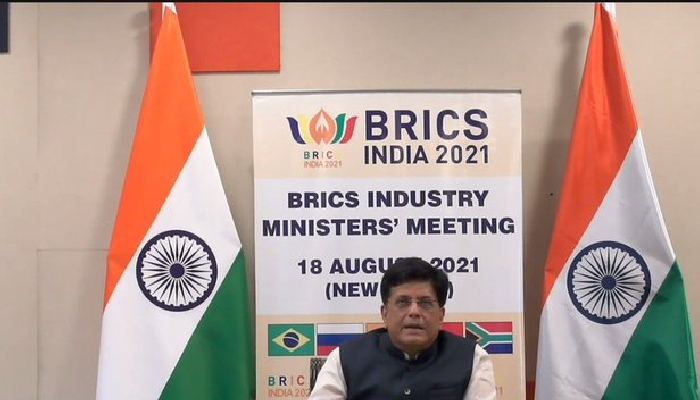India calls for channelizing technology towards good and smart governance in order to increase transparency and accountability
India suggested that the resources of the New Development Bank (NDB) should be utilized for strengthening of social infrastructure in addition to promotion of the Industrial sector at the 5th meeting of BRICS Industry Ministers Meeting under the Chairship of India on Wednesday.
“India expressed the desire to expand the horizon of NDB and resources be utilized for strengthening of social infrastructure besides promotion of the Industrial sector,” said a statement of the Ministry of Commerce and Industry.
Union Minister of Commerce and Industry, Consumer Affairs, Piyush Goyal chaired the meeting that was attended by his counterparts from all the other four BRICS countries.
India has chosen the theme of BRICS@15: Intra BRICS Cooperation for Continuity, Consolidation and Consensus for this year.
India’s efforts of channelizing technology towards good and smart governance thus increasing transparency and accountability were highlighted, said the statement.
It stated that India has developed a vibrant and dynamic start-up ecosystem, leveraging existing platforms and digital technologies such as Aadhar and UPI payments for ensuring delivery of critical services to the last mile.
Online systems like COWIN and digital vaccination certificates are being cited as success stories across the world today, the statement added.
BRICS Ministers recognized the unprecedented impact of the COVID-19 pandemic particularly in the fields of trade and industry.
They complimented all the COVID warriors, our doctors, nurses, paramedical staff and scientists, across all the BRICS countries, for their selfless and tireless efforts in saving our lives.
BRICS members appreciated the need for adopting the emerging new technologies in a swiftly changing world and recognized this as an important tool for modernization and transformation of industry, promotion of inclusive economic growth, thus helping BRICS national economies to meet the Sustainable Development Goals.
They agreed on the need to build human resources in line with the changing requirements accelerated by the new emerging technology to promote training and skills development of the related workforce and businesses through workshops, seminars, and exchange programs.
Ministers reiterated their commitment to make efforts to foster open, fair, and non-discriminatory trade environments, ensure greater participation in global value chains, promote digital inclusion, assess the implications, and encourage the progressive, safe, equitable, and sustainable use of disruptive technologies for advancing growth.
The meeting concluded with the BRICS Industry Ministers reaffirming their commitment to work together as a group, complement strengths of each other, share best practices and learn from weaknesses, and move ahead in a positive and constructive manner to achieve the 2030 Agenda for Sustainable Development.
 Contact Us
Contact Us  Subscribe Us
Subscribe Us









 Contact Us
Contact Us
 Subscribe
Subscribe
 News Letter
News Letter

